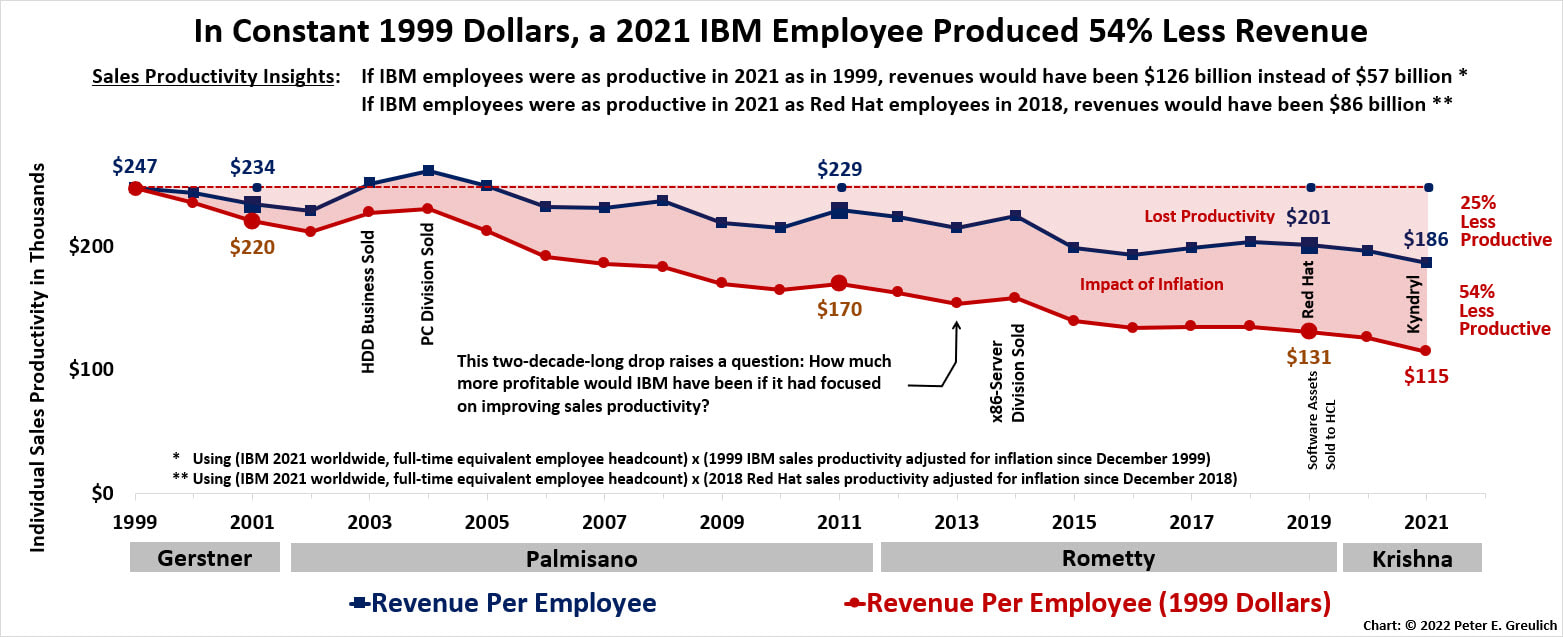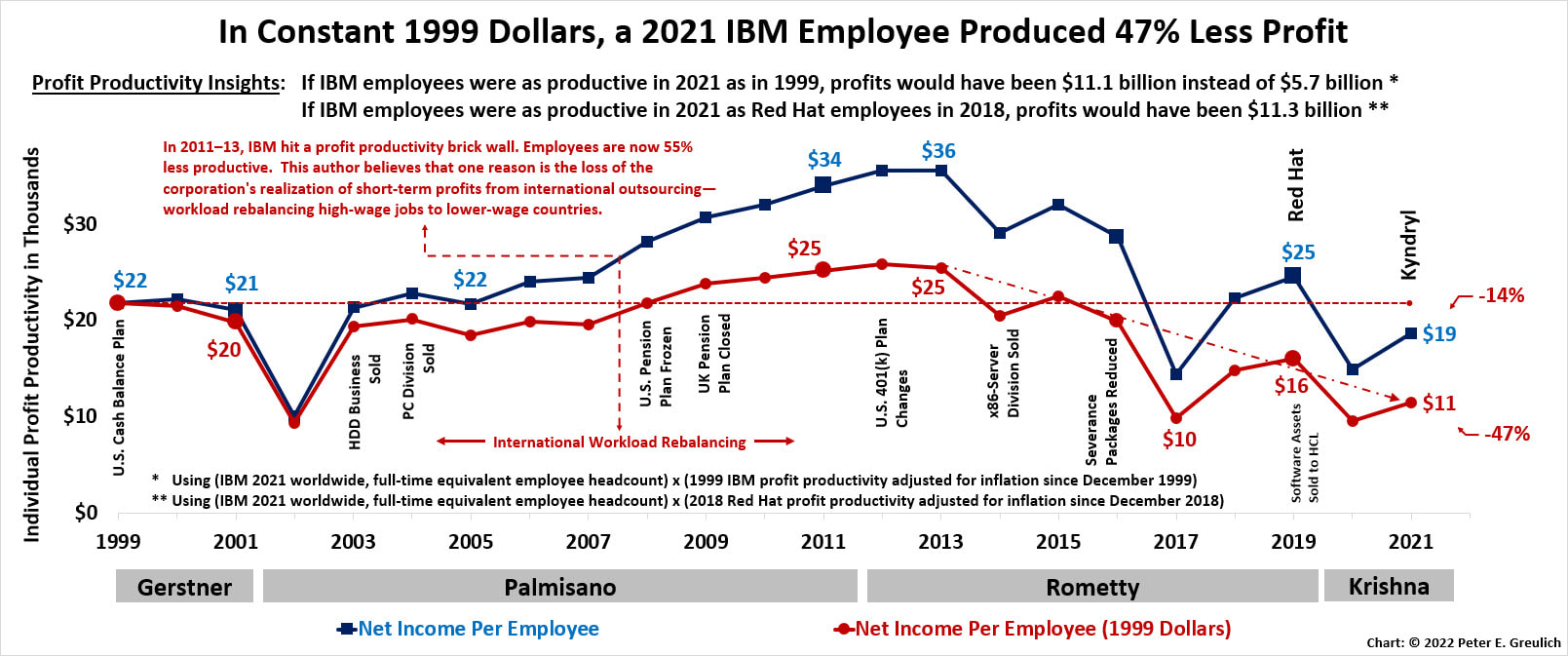If my foresight were as clear as my hindsight, I should be better off by a damned sight.
If my foresight were as clear as my hindsight, I should be better off by a damned sight.
IBM's Financial Engineering: U.K. Pension Scheme
|
|
Date Published: July 30, 2021
Date Modified: June 30, 2024 |
In the years since the freeze [the United States pension plan freeze in 2008] was announced, the gains from curtailing benefits have added nearly $3 billion to IBM's Income.
Ellen E. Schultz, "Retirement Heist: How Companies Plunder and Profit from the Nest Eggs of American Workers"
Since it worked so well in the United States, IBM took the strategy to the United Kingdom. Unfortunately, IBM’s twenty-first-century strategic decisions have been focused, for more than two decades, on maximizing the saving of a short-term, tangible penny at the expense of long-term, intangible, productivity dollars.
The U.S. meaning of "scheme" is probably correct as applied to all IBM's pension changes since 1995:
The U.S. meaning of "scheme" is probably correct as applied to all IBM's pension changes since 1995:
- scheme: /skēm/ - to make plans, especially in a devious way or with intent to do something illegal or ethically wrong.
IBM Won a Battle in Britain [and the US] but It Is Losing the Productivity War
- IBM's Battle of Britain is Symptomatic of Its Worldwide Dilemma
- Human Resource Practices Are Destroying Employee Engagement
IBM's Battle of Britain is Symptomatic of IBM's Worldwide Dilemma
On August 4th, 2017, The Register published an article entitled, "UK IBMers lose crucial battle in pension row." This is a similar situation to what the U.S employees experienced with the conversion of their defined benefit pension plan to a cash balance plan. In 1999, IBM's executive leadership field tested cutting pensions in the United States. The U.S. justice system gave them what they wanted—a bye.
They fine-tuned the plan and rolled it out in the United Kingdom in 2009—and now, another bye from the UK justice system. IBM has used the same logic to shutter the UK pension scheme that they used to close the U.S. pension plan: competitiveness and to "achieve sustainable progress against its productivity objective."
Unfortunately, IBM's 21st Century leadership doesn't understand how to produce a productive employee. In fact, they have created just the opposite: a work environment that is so toxic that even the best-of-the-best hold their noses as they head off to work. Because of this, IBM is suffering from a worldwide, two-decade-long, non-union-driven, work slowdown.
What IBM is experiencing is just the natural result of human beings responding to their corporation's "shareholder-first and -foremost" or "me-first and -only" human resource practices. IBM's current leadership has proven that they can only produce profits through (1) financial engineering: workforce rebalancing, and (2) aggressive bookkeeping: pension plan changes, 401(k) retirement changes, severance pay reductions, and divestitures.
They fine-tuned the plan and rolled it out in the United Kingdom in 2009—and now, another bye from the UK justice system. IBM has used the same logic to shutter the UK pension scheme that they used to close the U.S. pension plan: competitiveness and to "achieve sustainable progress against its productivity objective."
Unfortunately, IBM's 21st Century leadership doesn't understand how to produce a productive employee. In fact, they have created just the opposite: a work environment that is so toxic that even the best-of-the-best hold their noses as they head off to work. Because of this, IBM is suffering from a worldwide, two-decade-long, non-union-driven, work slowdown.
What IBM is experiencing is just the natural result of human beings responding to their corporation's "shareholder-first and -foremost" or "me-first and -only" human resource practices. IBM's current leadership has proven that they can only produce profits through (1) financial engineering: workforce rebalancing, and (2) aggressive bookkeeping: pension plan changes, 401(k) retirement changes, severance pay reductions, and divestitures.
- Sales Productivity Has Been Falling for Two Decades
- Profit Productivity—even with Financial Engineering—Was Barely Flat, and Then It Hit a Brick Wall in 2013
It doesn't take much imagination to visualize where IBM's profitability would have been without the $3 billion added to its bottom line from the U.S. pension plan starting in 2008 (highlighted above from Ellen Schultz book) and probably an equivalent amount from the U.K. pension scheme starting in 2009.
In 2011-13, international workforce rebalancing's production of short-term profits peaked.
It is worth noting—because the corporation told both country's justice systems that these changes were "productivity" and "competitive" necessities—that neither of the corporation's productivity numbers are competitive within its industry. IBM picked this battle with its employees, but its employees are having the final say in this sales and profit productivity war.
The corporation finds itself in the same situation it did in 1914 when Watson Sr. declared, "There is little enthusiasm." A saying of Abraham Lincoln also comes to mind: "a house divided against itself."
There is a way back, but it will require a new leader that first, believes productivity is important and second, understands how to inspire and maintain employee enthusiasm, engagement and passion: the hallmarks of a productive employee.
So far Arvind Krishna has not been that person.
Cheers,
- Peter E.
The corporation finds itself in the same situation it did in 1914 when Watson Sr. declared, "There is little enthusiasm." A saying of Abraham Lincoln also comes to mind: "a house divided against itself."
There is a way back, but it will require a new leader that first, believes productivity is important and second, understands how to inspire and maintain employee enthusiasm, engagement and passion: the hallmarks of a productive employee.
So far Arvind Krishna has not been that person.
Cheers,
- Peter E.


